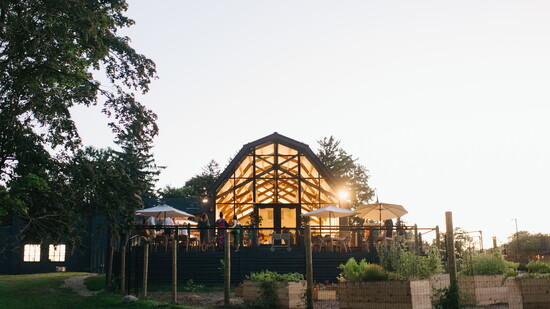In Ann Arbor, Sava is a household name. But Sava Farah’s road to becoming an Ann Arbor icon wasn’t paved with investment capital or an inherited empire. She built it herself — one café, one dish, one carefully considered decision at a time.
On the day of this interview, a crisp, early spring morning, she's driving toward Chelsea, Mich., to visit a farmer about the spring’s first greens. She’s still doing what she’s always done: shaping the future of her restaurants with her own two hands.
Her flagship restaurant, Sava’s, has long been a go-to for university students, professionals, and families alike — a place where a kale Caesar and a burger hold equal weight on a menu designed for comfort and inclusivity. But to understand Sava’s restaurants, you have to understand Sava herself. The woman behind some of Ann Arbor’s most beloved dining experiences didn’t stumble into success. She made it, starting with a single, improbable bet on herself.
Born to Albanian immigrant parents, Farah left the familiar confines of Metro Detroit in 2007, seeking a place where she could prove herself outside the expectations of her tight-knit community. She arrived in Ann Arbor with a plan as audacious as it was uncertain: find a restaurant space nobody else wanted, convince a landlord to take a chance on her, and make something out of nothing.
“I literally opened a paper map and looked for a city that was close enough to my family, but far enough from the microscope,” she recalls. “Ann Arbor felt like a place where I could do something real.”
That something turned out to be a tiny café on State Street. The early days were scrappy — a month-to-month lease, minimal staff, long hours — but she was there, day in and day out, pouring coffee, making food, and getting to know every customer who walked through the door. “I was making every plate, serving every dish,” she says. “I knew my customers by name, I knew their orders. I wasn’t just running a café — I was building relationships.”
When the café relocated in 2009 and she made the leap from a small counter-service spot to a full-scale restaurant, the move was risky. Farah was 25 years old, taking over a large space in the middle of an economic downturn — but the community she had fostered followed her. Sava’s, in its new home, solidified itself as an Ann Arbor institution. Today, it’s a community hub, a place where regulars are known by name and where the welcoming atmosphere has made it a fixture in the daily rhythms of the city.
But she didn’t stop there.
A few years later, she opened Aventura, a Spanish-inspired restaurant housed in a historic 1800s building. Where Sava’s is warm and approachable, Aventura is sultry and intimate, a place where rustic tapas and craft gin cocktails set the tone.
“When I opened Aventura, I wanted it to be really authentic — not just the food, but the whole experience," she says. "The history of the building, the atmosphere, the way people come together over a meal — it all had to feel real.”
The commitment to authenticity was unwavering. Before opening, she and her team traveled to Spain, immersing themselves in its food, culture, and architecture. "We didn’t want to be a Spanish-inspired restaurant," she says. "We wanted to be a Spanish restaurant. We wanted to nail it. We wanted to be pouring gin and tonics the way they do in Spain, making paella the way they do in Spain."
That dedication earned Aventura the recognition of international Spanish food authorities, solidifying its place as more than just a local favorite.
Then came The Dixboro Project, a multi-venue concept outside the city center, rooted in a deep respect for nature and the bounty of the soil. Here, she continues to embrace her love of locally sourced ingredients, working closely with area farmers to bring seasonal menus to life. Beyond its commitment to local ingredients, Dixboro is also about stewardship — of both the land and history.
Sava and her team have worked to rehabilitate both the historic building that houses the project and the surrounding ecosystem, incorporating sustainable practices like prescribed burns and habitat restoration to ensure the land thrives alongside the restaurant. “Ann Arbor has always been a place that supports local,” she says. “I wanted to create a space where you could see that commitment at every level.”
Across all her restaurants, the common thread is a deep respect for place — both in terms of community and physical space. “I’ve always been drawn to spaces with history, spaces that have a story,” she says. Whether it’s a century-old farmhouse or a downtown storefront, Farah’s gift is in seeing what could be and making it real.
From her first café to The Dixboro Project, Farah has redefined Ann Arbor’s culinary landscape. Each of her restaurants offers something distinct — whether it’s the easy familiarity of Sava’s, the transportive experience of Aventura, or the seasonal, farm-driven ethos of Dixboro. Yet, what ties them together is her unwavering commitment to thoughtful hospitality and deep community roots.
Her vision goes beyond food — it’s about creating spaces that feel essential to the fabric of the city. “I want these restaurants to be places where people celebrate, where they come to mark big moments in their lives,” she says. “But also, places where they just feel at home.”
thepulpogroup.com
